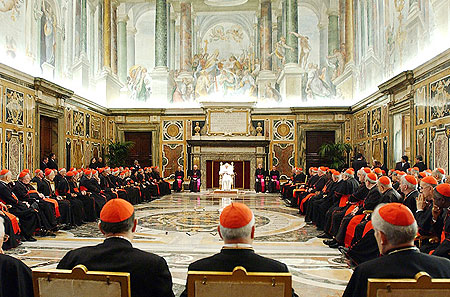In the Vatican the three letter word “sex” makes the City’s insiders shudder. Pope Benedict XVI’s legacy is endangered as the scandal is sucking him in. His role in the “mismanagement” of sex abuse cases in the 1980s - as the archbishop of Munich, and as head of the Vatican’s disciplinary Congregation for the Doctrine of the Faith – has put him in a weaker position.


In the Vatican the three letter word "sex” makes the City’s insiders shudder.
Pope Benedict XVI’s legacy is endangered as the scandal is sucking him in.
His role in the "mismanagement” of sex abuse cases in the 1980s - as the archbishop of Munich, and as head of the Vatican’s disciplinary Congregation for the Doctrine of the Faith – has put him in a weaker position.
Recent scandals rocking the Holy See are seen to be its most damaging crisis of modern times, and have prompted the "Vicars of Christ” to make unusual statements.
Imagine when the Vatican claims the Bishops are neither officials nor employees of the Vatican. A remarkable defence!
The Vatican’s expert witness, Edward Peters, a canon lawyer warns: "Explaining the relationship between the pope and the bishops is extraordinarily complicated for even the best theologians, canonists, and historians.”
Peters said to his knowledge, "no civil or canonical court has ever previously attempted to resolve this issue;” debates over the relationship between bishops and the pope led to disputes as profound as the Great Schism of 1054.
Perhaps this issue should be left to Common and Canon lawyers to give us an answer. There are more to deal with.
Many people, including myself, had always thought the Pope and the bishops were in the same chain of command, but this clarity is being challenged by the present case against the institution for a decades-long cover up of priests sexually abusing children in the U.S.
Not Africa, mind you. Are there obvious reasons for this?
On his way to Portugal, on May 11, 2010, Pope Benedict XVI blamed the church’s own sins for the clerical abuse scandal.
The pontiff said the scandal was not a campaign mounted by outsiders. He described it as the "greatest persecution” the church has endured. His words were carefully chosen.
There came a notable confession: "The greatest persecution of the church doesn’t come from enemies on the outside but is born from the sins within the church,” the pontiff said.
He insisted: "The church needs to profoundly relearn penitence, accept purification, and learn forgiveness but also justice.”
Owning the blame is virtuous. The Pope acknowledged the Catholic Church had always suffered from problems of its own making but that "today we see it in a truly terrifying way.”
It may just be a public relations management strategy, but it requires courage to denounce superficial conversion, and for the pope to say he is against impunity.
In 1985, as Cardinal Joseph Ratzinger, he was involved in a cover up of a sex abuse scandal. Now that he is the Pope, the case has not gone anywhere.
I’m not trying to bounce back to the issue of the relationship between the Pope and the Bishops. It reminds me to again read the Bible.
Perhaps the right message is from Isaiah. "Wash yourselves! Purify yourselves! Take your wickedness from my sight! Stop doing evil, learn to do good! Seek again the right way, help the oppressed, do justice... (1saiah 1:16-17)
But would this be understood by the whole institution as a call to a return to God, thus leading to a change in practical conduct, to the interior change or metanoia? Real repentance, in the Pope’s message, is the essential aspect of prophetic preaching. (Jeremiah 25:3-6)
Pope Benedict’s appeal for expiation after the shame brought by paedophile priests is a serious thing in this world of technology and sophisticated news coverage.
He is worried that the conduct of the impenitent within the Church may cause it to perish like the barren fig tree. (Luke 13:1-9 or Mathew 21:18-20)
Five days after his election, in a papal conclave, Pope Benedict XVI celebrated his papal inauguration mass on April 24, 2005. Exactly five months later, on September 24, the Pope met with Father Hans Kung in Castel Gandolfo, outside Vatican City.
The Vatican described the encounter of the two influential theologians as "friendly.” Reasons and the details of the meeting were not revealed.
The Swiss-born theologian, Fr. Kung has taught theology in Germany for many years. He has challenged official Catholic Church positions.
Like Ratzinger, Kung was a theological expert at the Second Vatican Council, but he questions papal infallibility, birth control, priestly celibacy and the all-male priesthood.
Concerning sex, Kung advises: "If priests were allowed to marry, if this would be an optional thing, and if he could have wife and children, he would certainly have less temptation to satisfy certain sexual impulses with minors.”
Kung notes that there are other scandals than sex within the church: "Time and again we see leaders and members of religions incite aggression, fanaticism, hate, and xenophobia - even inspire and legitimate violent and bloody conflicts.”
To be Continued…


